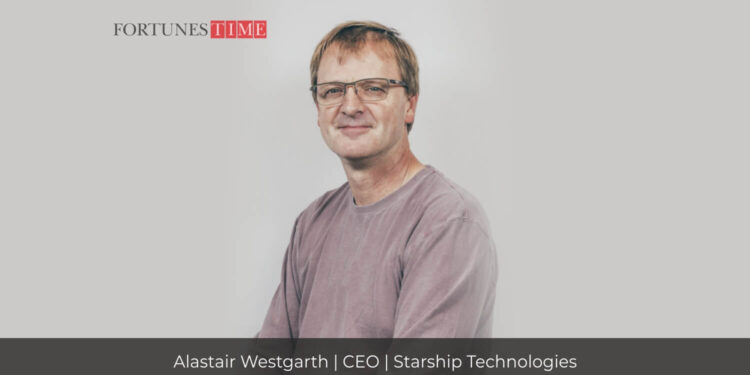Alastair Westgarth CEO at Starship Technologies. He oversaw Loon, Alphabet’s 2017 effort to offer internet via high-altitude balloons, before joining Starship Technologies. At the start of this year, the project was permanently closed. “The road to commercial viability has proven much longer and riskier than hoped,” the business wrote in a goodbye blog post. Westgarth had executive positions at Quintel Solutions, a wireless antenna firm, as vice president at Nortel, a telecommunications corporation, and director of engineering at Bell Mobility before joining Loon.
Alastair claims that while the concept of self-driving cars bringing goods directly to our doors may not seem revolutionary, there are currently few instances of last yard or meter delivery at that level in operation. In ten years, it will be standard procedure to do this. There are more than 10,000 big cities worldwide and 144 million homes in the United States. It is intrinsically difficult to use autonomous cars to reach such a vast range of locations, but we must begin doing it immediately in an area that is reasonably typical of a larger world with moving people, various forms of transportation, and some degree of unpredictability.
About the Company
Small, cooler-sized autonomous delivery robots are manufactured by Starship. Over the past several years, the firm has gained significant popularity in the United States by delivering food to college campuses. Since then, Starship has expanded its offerings to include grocery delivery from Modesto, California’s Save Mart. Starship began delivering goods from a few Costa Coffee outlets in the UK town of Milton Keynes in May of this year.
Because it is contactless, the epidemic has increased interest in robot delivery. Numerous robot delivery firms have emerged globally after the introduction of Starship, including Kiwibot and Postmates in the United States, Yandex in Russia, Woowa Brothers in South Korea, and Bizero in Turkey. Currently, the challenge facing all of these firms is whether it will be financially feasible to create, manage, and deploy all of these robots.
In order to pioneer this last yard/meter delivery model, Starship Technologies is now one of the very few handful of organizations that really employs autonomous cars to work in Milton Keynes, UK; Finland; and thirty chosen US college campuses. As trailblazers for the rest of us, students are spearheading that adoption process. When it comes to the quantity of autonomous vehicle deployments, the corporation leads the globe.










